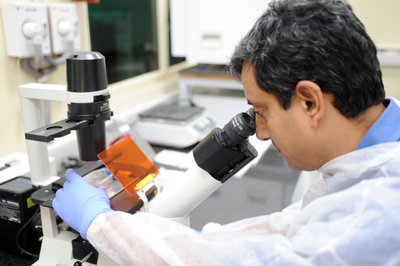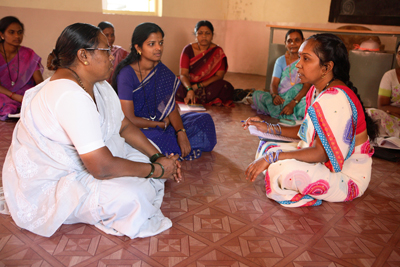April 2, 2021
Donor Spotlight: Government of India
IAVI recognizes the Government of India for their unwavering support of the development of safe, effective, accessible, preventive HIV vaccines and biomedical prevention products for use throughout the world.

IAVI has been engaging with policymakers, scientists, and HIV activists in India for two decades to mobilize scientific, political, and financial resources to support HIV vaccine and more recently HIV biomedical prevention product development. IAVI’s India program, established in 2001, began through an agreement with the Indian Council of Medical Research (ICMR), Ministry of Health and Family with the goal of ensuring that India becomes a regional center of excellence in the research and development of vaccines against major global infectious diseases, including HIV/AIDS. Additionally, IAVI has worked closely with the Department of Biotechnology (DBT) established under the Indian Ministry of Science and Technology in 1986 to lead development in the field of modern biology and biotechnology in India.
Since 2001, steadfast support from the Government of India (GOI) continues to expand IAVI’s life-saving work in India. HIV still remains one of the most challenging viral diseases worldwide and for India — despite substantial progress in reducing new incidence of HIV — the country still as the third-highest number of people of people living with the disease at 2.1 million. However, infection rates have levelled off and there remains much work to be done. India needs new ways to prevent the infection spread — chief among these is a vaccine.
Partnership with GOI helped pioneer new models for biomedical innovation in India
IAVI’s longstanding partnership with various arms of the GOI has facilitated the creation of innovative national and bilateral programs that are redefining the boundaries for biomedical innovation. Through a unique mix of in-house technical expertise and a robust global network, IAVI has helped pioneer new models of multidisciplinary, multi-sectoral, and multi-regional collaboration to strengthen the country’s value proposition as a model worth emulating for the development of novel biomedical products by and for the global South.
Highlights of IAVI GOI work since 2001 include:
- In partnership with the Translational Health Science & Technology Institute (THSTI), IAVI supports the HIV Vaccine Translational Research (HVTR) Laboratory that focuses on strategies to accelerate the design and evaluation of novel immunogens and antibodies for HIV, snakebite venom, and other diseases. Its achievements include identification of novel antibodies, designing fully cleaved envelope trimers as immunogens, and leveraging IAVI’s global network to enhance native research capabilities.
- IAVI assisted the Ministry of Health and Family Welfare in conducting three Phase I HIV vaccine clinical trials, strengthening domestic
 HVTR Director Jayanta Bhattacharya examining HIV infected cells through an inverted microscope at the HVTR Lab in Faridabad, Indiacapabilities by establishing the first globally compliant vaccine trial sites in partnership with centers of research excellence such as National AIDS Research Institute (NARI) and National Institute for Research on Tuberculosis.
HVTR Director Jayanta Bhattacharya examining HIV infected cells through an inverted microscope at the HVTR Lab in Faridabad, Indiacapabilities by establishing the first globally compliant vaccine trial sites in partnership with centers of research excellence such as National AIDS Research Institute (NARI) and National Institute for Research on Tuberculosis. - DBT-ICMR-IAVI led Cohorts for HIV Resistance and Progression in Indian Children and Adults (CoHRPICA) program represents the first nationwide, multi-site effort for the systematic and structured study of HIV in Indian populations of interest. Its outstanding features include the establishment of a national biorepository and national database for access to well-characterized samples and integrated data from across cohorts and studies.
- IAVI-facilitated Indo-Dutch partnership for comparative HIV research led by the DBT in India and Erasmus Medical University in the Netherlands leverages next-generation technologies and advanced analytics to better understand HIV progression toward tackling critical challenges such as drug resistance and functional cure.
- IAVI-facilitated Indo-South Africa partnership for advancing HIV and HIV/TB research led by the DBT in India and Department of Science and Technology in South Africa and the South African Medical Research Council aims to facilitate partnerships between research institutions in India and South Africa. This collaboration advances discovery efforts to develop new technologies and products for prevention and management of HIV/AIDS and TB by building scientific leadership capacity, fostering a sustainable environment for translational research, and enhancing clinical capability/capacity.
- IAVI in collaboration with ICMR established NARI-AIDS Rural Research Initiative in Maharashtra (NARRIM) focused on creating community-based open cohorts to understand the dynamics of the HIV epidemic in rural settings. This initiative represented a marked shift in achieving population-level synergies to both inform product development and enable global access for future HIV prevention products.
- The GOI-led India-Africa Health Sciences Collaboration was established to invigorate health R&D ecosystems in the two regions through innovative joint research and capacity building efforts to help boost product development, medical education, technology transfer, and trade and commerce. Based on the mandate of the Hon’ble Prime Minister of India announced at the India Africa Forum Summit III, it capitalizes on regional diversities and complementary strengths to collaboratively pursue shared health goals. IAVI works integrally with partners for establishment and management of this collaboration.
- Through its policy and advocacy work IAVI has played a transformative role in shifting the research emphasis on HIV vaccines and other
 Women from the John Paul Slum Development have their weekly meeting with NARI workers in Pune. This is one of the NGOs through which NARI undertakes community education work. Photo credit: Jean-Marc Gibouxnew prevention tools or diagnostics beyond traditional prevention and treatment programs, as a national priority in India in close collaboration with the GOI, scientific community, media, and other civil society stakeholders. Through these parallel efforts, IAVI, now registered in India as a Section-25 nonprofit entity, is orchestrating the creation of an effective framework for India to emerge as a regional center of excellence for R&D in vaccines and other research tools and diagnostics that provide cost-effective solutions against HIV and other major global infectious diseases. These efforts include:
Women from the John Paul Slum Development have their weekly meeting with NARI workers in Pune. This is one of the NGOs through which NARI undertakes community education work. Photo credit: Jean-Marc Gibouxnew prevention tools or diagnostics beyond traditional prevention and treatment programs, as a national priority in India in close collaboration with the GOI, scientific community, media, and other civil society stakeholders. Through these parallel efforts, IAVI, now registered in India as a Section-25 nonprofit entity, is orchestrating the creation of an effective framework for India to emerge as a regional center of excellence for R&D in vaccines and other research tools and diagnostics that provide cost-effective solutions against HIV and other major global infectious diseases. These efforts include:
- Working integrally with Biotechnology Industrial Research Assistance Council, under the DBT, to provide knowledge management support for Innovate in India (i3) Program. This World Bank funded program aims to establish indigenous product development ecosystems by engaging Indian academic researchers, start-ups, subject matter experts, contract development and manufacturing organizations, and biopharmaceutical manufacturers for development of vaccines, antibodies, and medical devices across preclinical, clinical, and early manufacturing stages.
- Supporting Biotechnology Industry Research Assistance Council-led Knowledge Integration and Translation initiative for conducting gap analysis of current health systems in India in working with national and state governments across different disease domains and regions, to arrive at a systems-level diagnosis, and propose contextualized and targeted solutions to policymakers.
THSTI aims to develop innovative antibody prevention and treatment strategy
Most recently, the India Alliance, a joint DBT and Wellcome initiative, awarded funding to IAVI partner THSTI to develop a broadly neutralizing monoclonal antibody mediated prevention and treatment strategy by assessing their effectiveness in neutralizing HIV‐1 subtype C that circulates across various regions in India. Broadly neutralizing antibodies (bnAbs) have shown protective effect against HIV-1 infection in animals and are currently in clinical trials for assessing their preventive and therapeutic potential. Studies have also explored their potential to replace or supplement antiretroviral therapy for newborn infants with HIV-1 positive mothers to reduce mother to child transmission. Since >50% of the global HIV-1 infections and >90% in India are caused by subtype-C viruses, any HIV treatment or prevention product being developed must effectively neutralize the circulating subtype-C viruses. There remains need for better understanding of the suitability of bnAbs in a global pipeline for HIV-C infection. This multi-centered study brings together collaborators with complementary expertise across discovery to early development value chain for novel antibodies and leverages global partners to build sustainable capacity within the country for discovery and translational research. Study outcomes hope to further regional synergies across India and Africa by paving the path for antibody selection, based on suitability assessment against viral strains across different regions.
GOI expands its support for IAVI through COVID-19 vaccine and snakebite programs
Work with HIV has now translated to the COVID-19 response. IAVI is working as knowledge partner to support implementation of the Mission COVID Suraksha with DBT, a time critical initiative to ensure accelerated development of COVID-19 vaccines. The program supports development of COVID-19 vaccine candidates and strengthens the ecosystem through establishing clinical trial sites, immunoassay laboratories, and facilities for animal studies for their accelerated development. IAVI provides information on COVID vaccine landscape, periodic status of vaccines funded, and feasibility assessments as needed for technical appropriateness.
IAVI’s advocacy efforts mobilized domestic resources with the DBT GoI, which released an RFA for Globally Accessible and Cost-Effective Novel Antibodies for HIV, snakebite, and antimicrobial resistance, to fast-track antibody R&D. IAVI also made the first successful efforts toward raising funds through Corporate Social Responsibility (CSR) initiatives in India.
IAVI is grateful for the longstanding support of the government of India in partnership and proud to continue to work together to develop health technologies to combat HIV/AIDS, COVID-19, and other emerging infectious diseases, and improve the health of communities most impacted by infectious diseases.
Learn more about IAVI’s generous funders.